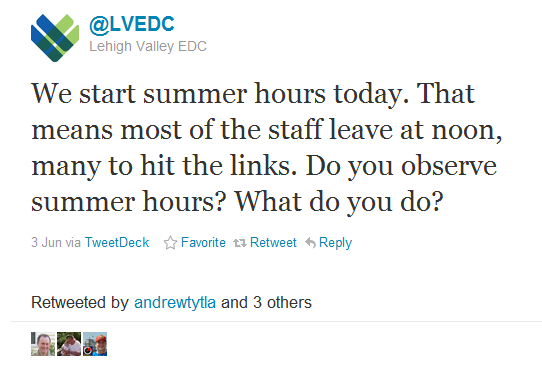By now you have likely heard something about the latest 'fired for something you Tweeted' tale, this one from the Philadelphia area where Social media specialist Vanessa Williams was fired from the Lehigh Valley Economic Development Corp. after using its Twitter account last weekend to tweet the following:

You can argue about the relative offensiveness of the tweet and whether or not the agency overreacted in its rapid termination of Williams following the Tweet, but it seems to me beyond doubt that this Tweet only became noteworthy, and the publicity surrounding the affair massively augmented by the decision to fire Williams, rather than simply issue a clarification, retraction, apology - whatever, and move on.
While I have no access or insight to private communications between members of the Lehigh Valley community and the agency following the 'Summer Hours' tweet, and thus don't know if the tweet truly resulted in a flood of outrage and angry calls and shouts about 'wasting the taxpayers money', I can see from the LVEDC's timeline that the public Twitter 'backlash' to the tweet was pretty tepid. In the moments after the tweet was sent, it appears only one other Twitter user, @KBlumenau, directly engaged with the LVEDC account on Twitter, and even his comments were not outrageous or all the angry. LVEDC, for it's part, offered a few responses about how 'no one is leaving early' and 'how the finance department was making deals'. Kudos LVEDC, I am sure we were all in fear that a couple of slack hours on a Friday afternoon in June would destroy the Lehigh Valley economy.
Certainly after the news broke the the LVEDC had fired Williams, and the news of the firing began to spread on the web, a flurry of tweets, most all of them expressing disappointment and disagreement with the firing decision for what most observers took as at worst an honest mistake. Williams herself has hired a lawyer, and wants to have her 'name cleared'.
We talk quite a bit in the blogging/tweeting/social communities about transparency and openness. And how organizations that come to more fully embrace the new modes of engagement and communication that social platforms provide will be the ones that can innovate more rapidly, attract (and retain) more dynamic talent, and be able to respond to customers in a meaningful and proactive manner. And of course many of us try to convince our organizations or advise other organizations that this kind of openness is really the way forward, and gives us the best chance for success and plays a role in crafting the kind of organization we'd be proud to work for.
But in order to do that, obviously, organizations need to trust that their newly empowered people will do the right thing, will act honestly and responsibly, especially when acting and participating in public forums on behalf of the company. Trust is essential. And the LVEDC had already taken that step, by placing their trust in Williams to Tweet on the official agency account and as part of her job duties. The LVEDC trusted Williams to do the right thing.
The problem was after the mildly inappropriate 'Summer Hours' tweet (again, very arguable), the LVEDC didn't trust that their community would not over react and become enraged at the most slight perception there was something amiss at the agency. The reason Willliams was fired, and the ongoing interest in the story is completely centered around the LVEDC's lack of faith in the community, businesses, and people they serve. The LVEDC assumed the worst of them, that they could not understand a simple comment about summer hours and golf on a Friday in June would bring the whole house crashing down.
If you don't trust your employees, then social media probably is not for you.
If you don't trust anyone, well, you have bigger problems than social media.